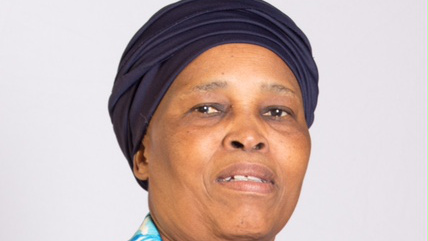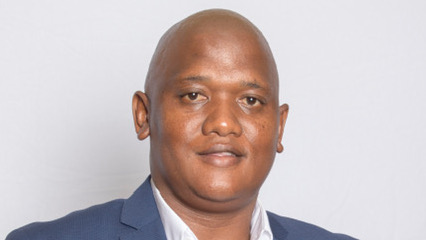Hon. Refiloe Kekana
This Mail & Guardian webinar was sponsored by the Gauteng Provincial Legislature (GPL). It featured as speakers: Hon. Alphina Ndlovana, Chairperson of the Community Safety Portfolio Committee; Hon. Gregory Schneemann, Committee on COGTA and Human Settlements; Hon. Refiloe Kekana, Member of the Provincial Legislature (MPL); and Hon. William Matsheke, MPL. It was moderated by Hector Motivator, Founder and Managing Director of The Motivation Company.
Hector Motivator began proceedings by outlining the topic of the webinar. He asked Hon. William Matsheke to outline the difference between the Gauteng Provincial Legislature and the Gauteng Provincial Government. Matsheke said there is often a confusion between the two at public participation events, the organisation of which is one of the duties of GPL to organise; but the GPL is, in a nutshell, the legislative arm of the province. He said every administration has its own priorities and goals. Each financial year the various departments present their progress on performance plans and how they are using their budgets, to the GPL.
The next presentation was made by Social Development MPL Refiloe Kekana. She explained the oversight and law-making roles of the Portfolio Committee, which checks if the objectives of the Social Development Department are aligned with their budget, and that there is good governance and efficient service delivery. Budgets are allocated to the various roles of the department, such as administration, restoration services, caring for homeless people, Early Childhood Development and the like. Adjustments had to be made to accommodate the Covid-19 pandemic, which amplified issues such as poverty and GBV.
Kekana was asked by Motivator about the EPWP (Expanded Public Works Programme) and whether there were problems associated with it, as questions were raised in the previous webinar, to which she replied that this programme is run at several different levels, from municipal to national, and all the various departments involved must spend their budgets optimally for the programme to run smoothly.
 Gregory Schneemann
Gregory SchneemannHon. Gregory Schneemann said his oversight concerns COGTA and Human Settlements. COGTA’s role is to provide support for municipalities and their delivery of basic services. Its budget is divided between administration, local governance, development and planning, and developing traditional institutions. A committee has been analysing municipalities’ progress, and its report will provide a useful tool for zooming in on critical areas where they need to improve on their performance. Proper planning is one area where COGTA can help; and experts will help to prevent, for instance, fruitless expenditure in municipalities. The skills of officials need upgrading, and COGTA can indicate which courses are the most useful.
The budget for Human Settlements is divided into four programmes: administration; housing needs, planning and research; housing development; and housing asset and property management. The critical areas that the department focuses on are urban renewal, mega developments, title deeds, hostel redevelopment, support for people with disabilities, and a new programme, that of land release, said Schneemann.
The oversight role of the Portfolio Committee concerns efficient spending of budget, and direct engagement with municipalities is now part of the strategy. The pandemic and lockdown has impacted on the delivery of projects by Human Settlements, and on municipalities, particularly regarding payment of services by people who lost their jobs. The focus is now on regaining lost ground and restoring services.
Hon. Alphina Ndlovana presented a reflection on the budget allocation for the Department of Community Safety. She said the Portfolio Committee receives constant complaints from the community concerning the effectiveness of, for instance, the police. The department only received a 3% increase in its budget for this financial year. There was an increase in the amount allocated towards dealing with GBV, concerning training of the police on the taking of statements from victims, and the deployment of the GBV brigades, who visit households and create awareness of the impact of GBV. The “green door” initiative provides access to safe houses for victims of domestic and sexual abuse.
 Hon. Alphina Ndlovana
Hon. Alphina NdlovanaAdditional training for the police was prioritised, and additional budget was allocated towards the provision of vehicles, surveillance, and the like. Covid-19 affected the filling of various vacant posts, and halted unannounced police searches at schools for drugs, as well as training programmes for the green door initiative. The allocated budget for the department was insufficient to address increased homelessness and crime, said Ndlovana.
Matsheke said he oversees the Gauteng Department of Sports. He said the budget the department is allocated is insufficient, in his opinion. The department is responsible for four functions: administration; cultural affairs; library services; and sports and recreation. This department was one of the most affected by Covid-19; its budgets were slashed, and cultural activities ground to a halt.
Requests were made for grants to provide some relief for artists and for sportspeople. This is a contentious issue, pointed out Motivator, as some people apparently received grants and others did not. The provincial and national departments were asked to provide relief funding, as the lockdowns affected artists very badly, replied Matsheke. The Portfolio Committee is committed to ensuring that the department delivers on community courts and other outstanding infrastructure projects.
Questions
Kekane spoke about a community centre in Soshanguve; the Portfolio Committee has visited and found it had some structural problems; the facility is closed until the problems get resolved.
 Hon. William Matsheke
Hon. William MatshekeSchneemann answered a question about a project in Tarlton; he said he will undertake to look into the issue and speak to the person who asked the question. Concerning the electrification of Orient Hills, he said there has been extensive engagement with the municipality concerned and it has been engaging with Eskom, but he cannot disclose the state of developments there. The community has closed a road in the area, and Schneeman appealed to the community to unblock it, while acknowledging that the concerns of the community are being taken seriously. Schneemann gave his email address; he said as a public representative, it is there to be used: [email protected] and his phone number is 0609999146.
Matsheke responded to a question concerning sport facilities in the Mogale area. He said rolling out of 40 community courts has been delayed for various reasons, but the West Rand area has been prioritised for development. The Social Cohesion Carnival was interrupted because of the pandemic, but there are plans to revive it, and other events, in accordance with Covid-19 regulations.
 Hector Motivator, Founder and Managing Director of The Motivation Company
Hector Motivator, Founder and Managing Director of The Motivation CompanyClosing remarks
Kekana appealed to the public to become informed about what government services are available in their areas, and interact with their councillors. Schneemann said in terms of Human Settlements, this year the department has a substantial grant to develop informal settlements, which must be monitored closely. He appealed to members of the public to pay for their services so that they can be delivered efficiently. Ndlovana said her department will be appointing additional traffic officers; that her department is dedicated to fighting crime; and that Covid-19 protocols must be observed. Matsheke said the Portfolio Committee is ensuring the sport and arts department is working hard at making Gauteng a filming destination; it is prioritising sports development in townships; artists must apply for relief funding; sport events need more funding; and the issues concerning the Performers’ Protection Amendment Bill must be finalised.